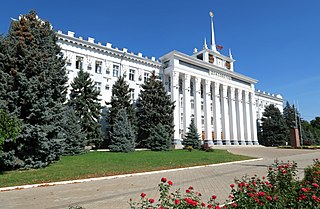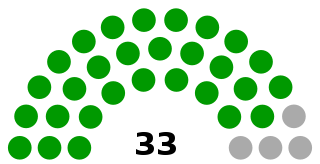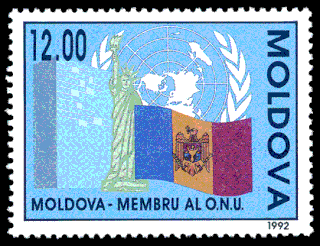The history of Moldova spans prehistoric cultures, ancient and medieval empires, and periods of foreign rule and modern independence.

The politics of Moldova take place in a framework of a parliamentary representative democratic republic, wherein the prime minister is the head of the Government of Moldova, and a multi-party system. The President of Moldova has no important powers. The government exercises executive power while the legislative power is vested in the Parliament. The judiciary is independent of the executive and the legislature. The position of the breakaway region of Transnistria, relations with Romania and with Russia, and integration into the EU dominate political discussions.

Tiraspol is the capital and largest city of Transnistria, a breakaway state of Moldova, where it is the third-largest city. The city is located on the eastern bank of the Dniester River. Tiraspol is a regional hub of culture, economy, tourism, and light industry, such as furniture and electrical goods production.

Transnistria, officially known as the Pridnestrovian Moldavian Republic and locally as Pridnestrovie, is a breakaway state internationally recognized as part of Moldova. It controls most of the narrow strip of land between the Dniester river and the Moldova–Ukraine border, as well as some land on the other side of the river's bank. Its capital and largest city is Tiraspol. Transnistria is officially designated by the Republic of Moldova as the Administrative-Territorial Units of the Left Bank of the Dniester or as Stînga Nistrului.

Igor Nikolaevich Smirnov is a Russian-born Transnistrian politician who served as the first president (1991–2011) of the internationally unrecognized Pridnestrovian Moldovan Republic.

The politics of Transnistria, an unrecognised de facto state situated de jure within the Republic of Moldova in Eastern Europe, take place in a framework of a semi-presidential republic, whereby the president is head of state and the prime minister is head of government. Executive power is exercised by the government. Legislative power is vested in both the government and parliament. Officially, Transnistria has a multi-party system and a unicameral parliament, called the Supreme Council. The president is elected by popular vote. The latest parliamentary elections were held in November 2020.

Obnovlenie, officially the Republican Party "Obnovlenie", is a political party in the unrecognized state of Transnistria, an entity that is internationally recognized as part of Moldova. It has been the parliamentary majority in the Supreme Council since 2005.

Ilie Ilașcu is a Moldovan-born Romanian politician, especially known for being sentenced to death by the separatist Transnistrian government for alleged involvement in two murders and for actions which have been described as Moldovan state-sponsored terrorism by Transnistrian government officials.

Sheriff is the second-largest company in the unrecognised breakaway state Transnistria, behind Moldova Steel Works. Based in the city of Tiraspol, it was formed in the early 1990s by Viktor Gushan and Ilya Kazmaly, former members of the KGB. Sheriff has grown to include nearly all forms of profitable private business in the unrecognised country, and has even become significantly involved in local politics and sport, with some commentators saying that company loyalists hold most main government positions in the territory. Anatoly Dirun, director of the Tiraspol School of Political Studies, stated that "Viktor Gushan is the person with the most influence here, both in politics and economics."

The Supreme Council of the Pridnestrovian Moldavian Republic is the unicameral legislature of the internationally-unrecognised state of Transnistria. It consists of 33 seats, all of which are determined by single mandate constituencies and is headed by a chairman.
The 2006 Transnistrian customs crisis started on March 3, 2006, when Ukraine imposed new customs regulations on its border with Moldova on the Transnistrian region by declaring that it will only import goods from Transnistria with documents processed by Moldovan customs offices, as part of the implementation of a joint customs protocol between Ukraine and Moldova on December 30, 2005.
Republic is a political party in Transnistria. The party is affiliated with former Transnistrian President Igor Smirnov.

Galina Mikhailovna Antyufeyeva is a Transnistrian politician and the wife of the breakaway state's former Minister for National Security, Vladimir Antyufeyev.
Aleksandr Radchenko was an ethnic Ukrainian politician and human rights activist from Transnistria. A former Soviet military officer, he was the editor of a small opposition newspaper in Tiraspol called Chelovek i ego prava. Most of his articles deal with human rights issues.

The Community for Democracy and Rights of Nations, also commonly and colloquially known as the Commonwealth of Unrecognized States, rarely as CIS-2, is an international organization in Eastern Europe and the South Caucasus of three breakaway states in the territory of the former Soviet Union, all of which have limited to no recognition from the international community.

The state of affairs with human rights in Transnistria has been criticized by several governments and international organizations. The Republic of Moldova, and other states and non-governmental organizations (NGOs) claim that the government of Transnistria is authoritarian and has a record of arbitrary arrest and torture.

Law enforcement in Transnistria is administered by the region's own police force. Transnistria functions as a presidential republic, with its own government, parliament, military, paramilitary and police (militsiya) force, constitution, currency, postal system and stamps, flag, national anthem, and coat of arms.

The following outline is provided as an overview of and topical guide to Transnistria:

The following is timeline of the History of independent Moldova which started after the independence of Moldova.

Moldova–Transnistria relations are the political and economic relations between the Republic of Moldova and Transnistria, an unrecognized state between the Dniester River and Ukraine. During the dissolution of the Soviet Union, political tensions in the Moldavian Soviet Socialist Republic led to Transnistria declaring independence from Moldova, culminating in the Transnistrian War of 1992. As part of the ceasefire agreement ending the war, a Joint Control Commission composed of Moldovan, Transnistrian, and Russian forces was established to supervise the demilitarized zone which was located in the Transnistrian region. The Joint Control Commission still supervises the zone, and negotiations to resolve the dispute are ongoing. The negotiations are supported by the Russian Federation, Ukraine, the United States, the European Union, and the Organization for Security and Co-operation in Europe (OSCE).













